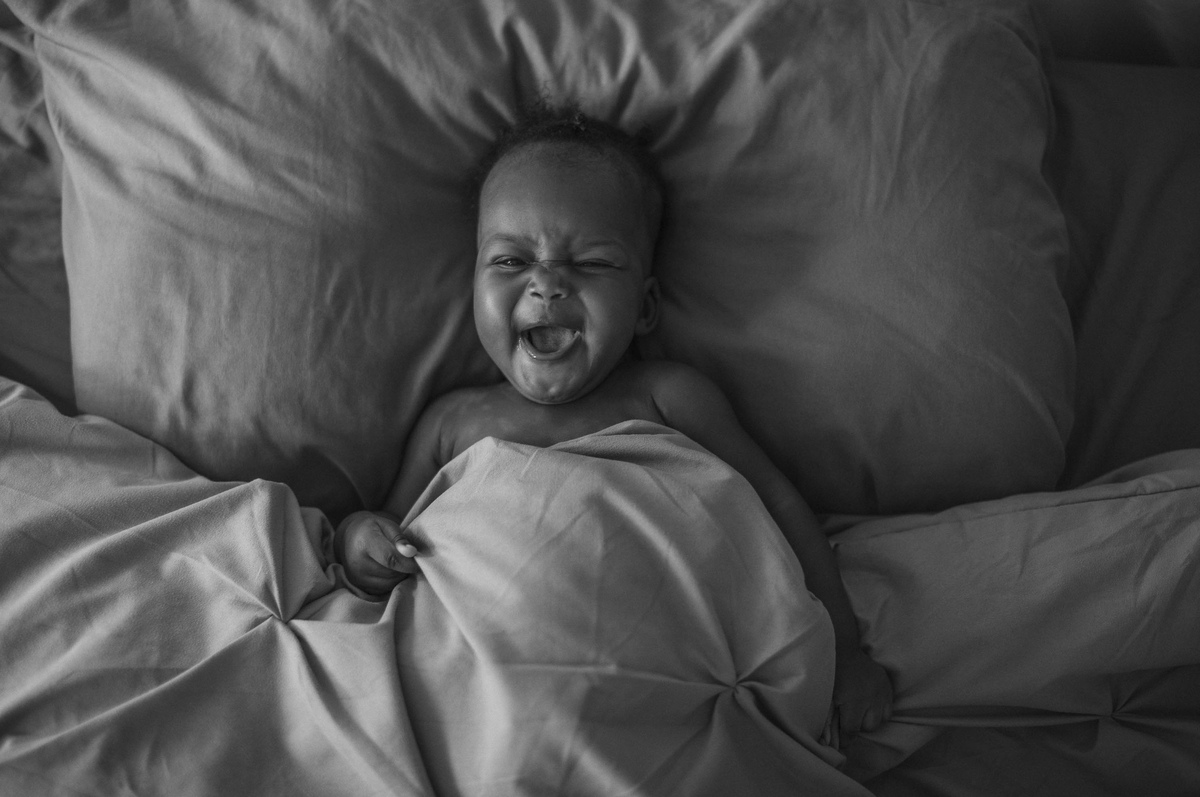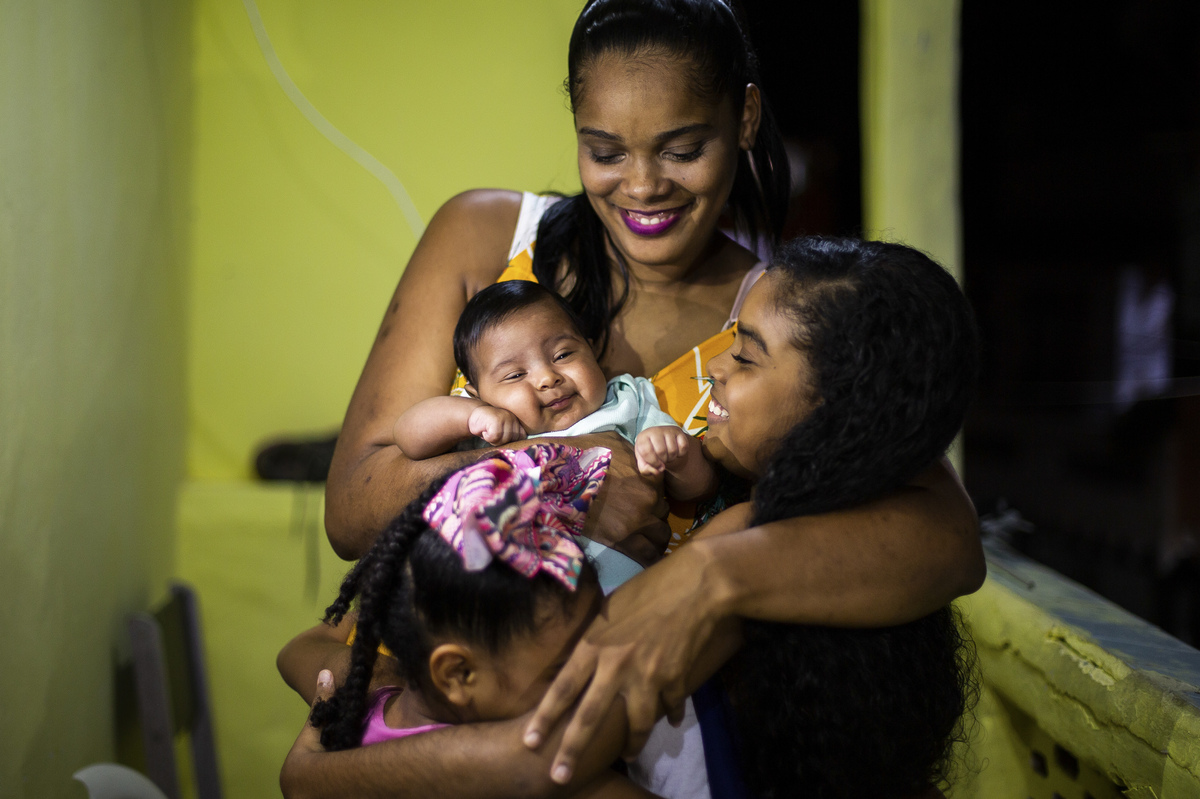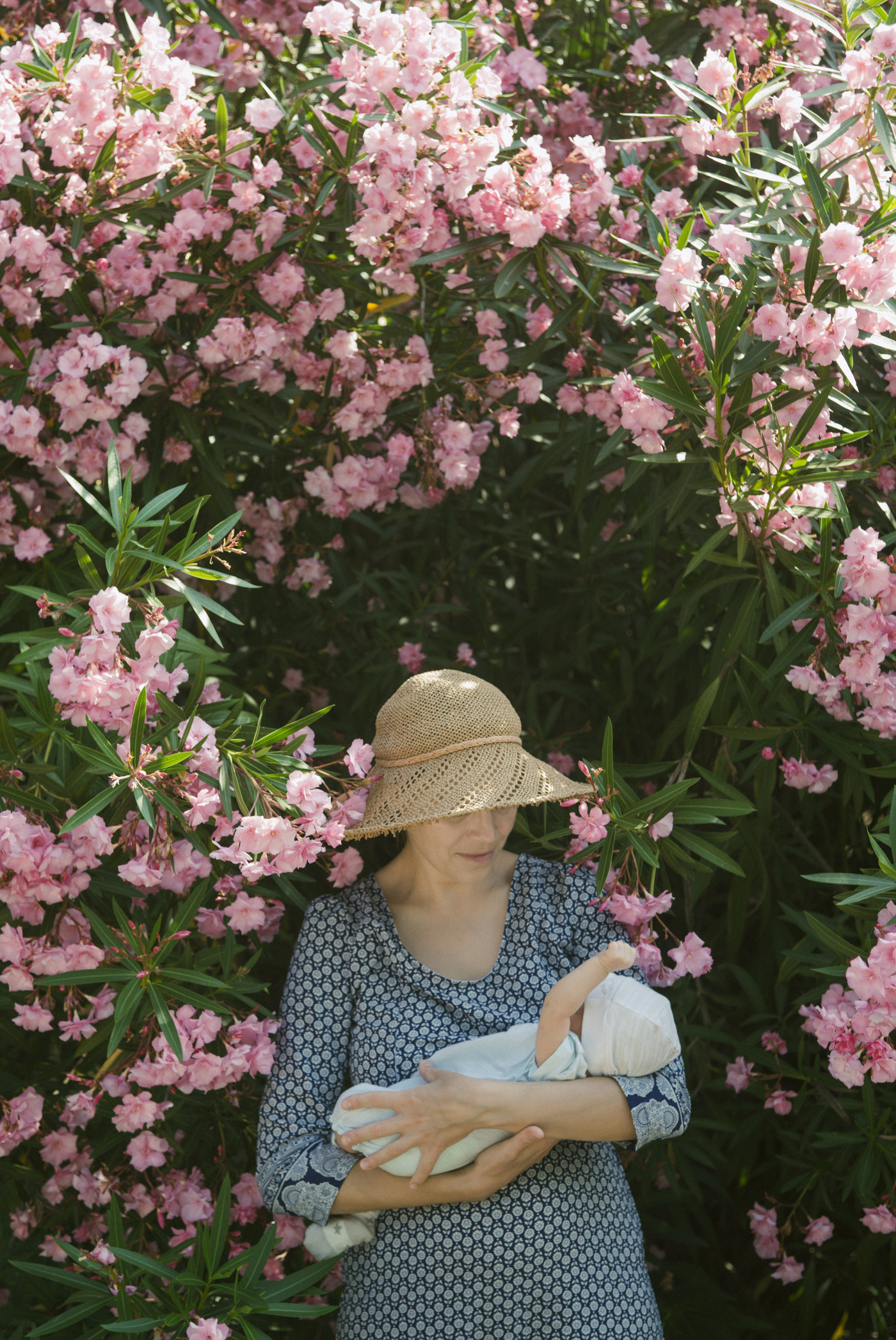
[ad_1]
What is it like to give birth during a global pandemic? What hopes and dreams — and fears — do the parents have when welcoming a newborn?
We asked the more than 600 photographers who work with Everyday Projects — contributing to Instagram accounts from countries in Asia, Africa, Central and South America, North America and Europe — to document the arrival of a baby born in 2020. In some cases, the photographer is one of the parents; in other cases they photographed babies in their community — from a safe, social distance.

Photographer Sarah Waiswa’s image of her daughter, Ria: “She spends a lot of time in our bed. Babies bring the hope of goodness and light, but 2020 has been a heavy year. I am afraid about the type of world I have brought her into. I hope by the time Ria grows up, human beings will be kinder to each other. June 21. Nairobi, Kenya.
Sarah Waiswa/@EverydayAfrica
hide caption
toggle caption

Photographer Sarah Waiswa’s image of her daughter, Ria: “She spends a lot of time in our bed. Babies bring the hope of goodness and light, but 2020 has been a heavy year. I am afraid about the type of world I have brought her into. I hope by the time Ria grows up, human beings will be kinder to each other. June 21. Nairobi, Kenya.

Sarah Waiswa’s self-portrait of herself with Ria at 4 months. “We went into lockdown a couple of weeks after she was born,” she says. “It’s strange not having family around to hold her.” July 5. Nairobi, Kenya.
Sarah Waiswa/@EverydayAfrica
hide caption
toggle caption

Sarah Waiswa’s self-portrait of herself with Ria at 4 months. “We went into lockdown a couple of weeks after she was born,” she says. “It’s strange not having family around to hold her.” July 5. Nairobi, Kenya.

Sarah Waiswa’s partner rocks Ria to sleep: “I love the fact that because of the lockdown my partner and I have had the chance to spend so much time together in addition to spending time with the baby. We would never have had that.” June 28. Nairobi, Kenya.
Sarah Waiswa/@EverydayAfrica
hide caption
toggle caption

Sarah Waiswa’s partner rocks Ria to sleep: “I love the fact that because of the lockdown my partner and I have had the chance to spend so much time together in addition to spending time with the baby. We would never have had that.” June 28. Nairobi, Kenya.


On March 18, Anastas Tarpanov’s wife gave birth to their daughter: “I’ll say to future parents: Don’t be afraid. This crisis will pass and you will have your baby. Embrace life and teach your kids to be better versions of yourselves.” March 21. Sofia, Bulgaria.

New father Anastas Tarpanov says: “I was not allowed to enter the maternity hospital during the time my wife gave birth or to see her and our new daughter for 4 days. This photo shows the first time we reunited as a family and the first time my older daughter saw her little sister.” March 21. Sofia, Bulgaria.
Anastas Tarpanov/@EverydayEasternEurope
hide caption
toggle caption

New father Anastas Tarpanov says: “I was not allowed to enter the maternity hospital during the time my wife gave birth or to see her and our new daughter for 4 days. This photo shows the first time we reunited as a family and the first time my older daughter saw her little sister.” March 21. Sofia, Bulgaria.

The online video connection was the only way for Anastas Tarpanov’s parents to see their granddaughters for a long period. He reflects: “The pandemic experience has showed us that we can live with fewer resources, and the most important thing is the people who are close to us. I hope my daughter carries these values.” April 1. Sofia, Bulgaria.
Anastas Tarpanov/@EverydayEasternEurope
hide caption
toggle caption

The online video connection was the only way for Anastas Tarpanov’s parents to see their granddaughters for a long period. He reflects: “The pandemic experience has showed us that we can live with fewer resources, and the most important thing is the people who are close to us. I hope my daughter carries these values.” April 1. Sofia, Bulgaria.

The day Maria Ionova-Gribina made this photo of Anastasia Markelova with her 2-year-old, she said, “I think I’m going into labor.” Now the mother of two, Markelova says, “We live a very unhurried life. Looking after the kids, planning our future, arguing and making peace. We’re also endlessly cooking, cleaning up, laughing and rescuing the dog from the children.” April 21. Moscow, Russia.
Maria Ionova-Gribina/@EverydayEasternEurope
hide caption
toggle caption

Maria Ionova-Gribina made this image 30 minutes after Anastasia Markelova delivered Iva. At the moment of childbirth Markelova was talking to her husband via WhatsApp since he could not be with her. Anastasia says, “When lockdown is over, I want a picnic with friends! To hug them, laugh, enjoy the sun! Everything will be all right. We just have to wait.” April 22. Moscow, Russia.
Maria Ionova-Gribina/@EverydayEasternEurope
hide caption
toggle caption

Lynzy Billing photographed a grandmother holding a newborn baby at the delivery ward at Mirwais Hospital. Says Billing: “I chose this photograph from a series I did on Afghan midwives working to deliver babies safely in Afghan hospitals during the coronavirus pandemic.” February 18. Kandahar, Afghanistan.
Lynzy Billing/@EverydayAfghanistan
hide caption
toggle caption

Lynzy Billing photographed a grandmother holding a newborn baby at the delivery ward at Mirwais Hospital. Says Billing: “I chose this photograph from a series I did on Afghan midwives working to deliver babies safely in Afghan hospitals during the coronavirus pandemic.” February 18. Kandahar, Afghanistan.

Paz Olivares-Droguett makes a picture of Amadeo’s morning washup with his father, her partner Matías: “Our son was born on January 31 and is now 5 months old. We have been in quarantine since March 16. Most of our family and friends have not met him yet as he has only gone outside for vaccinations.” April 16. Valparaíso, Chile
Paz Olivares-Droguett/@EverydayLatinAmerica
hide caption
toggle caption

Paz Olivares-Droguett makes a picture of Amadeo’s morning washup with his father, her partner Matías: “Our son was born on January 31 and is now 5 months old. We have been in quarantine since March 16. Most of our family and friends have not met him yet as he has only gone outside for vaccinations.” April 16. Valparaíso, Chile


Paz Olivares-Droguett made this picture on the day that marked 3 months of confinement to home: “The relationship between Amadeo and Eleonora, our firstborn, has been growing — and they are, too.” June 2. Valparaíso, Chile.

Antonelli Veneri photographed Iasnaia Lima holding her newborn daughter, Maria, after a home birth without the help of midwives or doctors. Lima says her pregnancy was “very lonely — with the pandemic we reduce the ‘team’ present before, during and after the birth.” June 4. Salvador, Brazil.
Antonelli Veneri/@EverydayBrasil
hide caption
toggle caption

Antonelli Veneri photographed Iasnaia Lima holding her newborn daughter, Maria, after a home birth without the help of midwives or doctors. Lima says her pregnancy was “very lonely — with the pandemic we reduce the ‘team’ present before, during and after the birth.” June 4. Salvador, Brazil.

Iasnaia Lima told photographer Antonelli Veneri why she named her baby Maria: “Maria is a common name and a tribute to all the common Black women who make micro-revolutions every day.” Her advice for new mothers: “Worry less about practical things like the baby’s room and clothes. A newborn only really needs a breast, a blanket and much, much love.” June 6. Salvador, Brazil.
Antonelli Veneri/@EverydayBrasil
hide caption
toggle caption

Iasnaia Lima told photographer Antonelli Veneri why she named her baby Maria: “Maria is a common name and a tribute to all the common Black women who make micro-revolutions every day.” Her advice for new mothers: “Worry less about practical things like the baby’s room and clothes. A newborn only really needs a breast, a blanket and much, much love.” June 6. Salvador, Brazil.

Jianne 21, told photographer Xyza Cruz Bacani: “I accidentally got pregnant and was scared when I gave birth because I was coughing. I was alone. Fear of getting the virus added to my worry. I gave up my son [for adoption] because they can give him a better life. Work is difficult since the pandemic, and I already have a daughter I support.” July 10. Nueva Vizcaya, Philippines
Xyza Cruz Bacani/@EverydayPhilippines
hide caption
toggle caption

Jianne 21, told photographer Xyza Cruz Bacani: “I accidentally got pregnant and was scared when I gave birth because I was coughing. I was alone. Fear of getting the virus added to my worry. I gave up my son [for adoption] because they can give him a better life. Work is difficult since the pandemic, and I already have a daughter I support.” July 10. Nueva Vizcaya, Philippines

Jianne holds the pacifier and the sonogram of her baby. She gave birth on June 29 and took care of the baby for 3 days before he was placed for adoption. “I miss my son,” she told photographer Xyza Cruz Bacani, “and I wish that I did not hold him for 3 days. They could just have taken him immediately.” July 10. Nueva Vizcaya, Philippines
Xyza Cruz Bacani/@EverydayPhilippines
hide caption
toggle caption

Jianne holds the pacifier and the sonogram of her baby. She gave birth on June 29 and took care of the baby for 3 days before he was placed for adoption. “I miss my son,” she told photographer Xyza Cruz Bacani, “and I wish that I did not hold him for 3 days. They could just have taken him immediately.” July 10. Nueva Vizcaya, Philippines


Renan Benedito photographed Marluce dos Santos Sousa, 32, and Davi, now 2 months old. During her pregnancy, she said, “I felt immersed in a sea of uncertainty” because of COVID-19 and her mother’s death. Her son “brought joy. I know Davi will find a different world. It will no longer be necessary for the pandemic to show us the value of being together.” July 1. Salvador, Brazil.
Renan Benedito/@EverydayBrasil
hide caption
toggle caption

Renan Benedito photographed Marluce dos Santos Sousa, 32, and Davi, now 2 months old. During her pregnancy, she said, “I felt immersed in a sea of uncertainty” because of COVID-19 and her mother’s death. Her son “brought joy. I know Davi will find a different world. It will no longer be necessary for the pandemic to show us the value of being together.” July 1. Salvador, Brazil.

Fábio Erdos made this picture minutes after the birth of his son, Teodoro Milton Erdos, when the nurses brought the baby to his mother, Lianne Milton, before taking him to the neonatal intensive care for respiratory issues. Milton says: “I have never experienced such profound joy and sadness within minutes. I uncontrollably shook from adrenaline.” February 16. Madison, Wisconsin.
Fábio Erdos/@EverydayBrasil
hide caption
toggle caption

Fábio Erdos made this picture minutes after the birth of his son, Teodoro Milton Erdos, when the nurses brought the baby to his mother, Lianne Milton, before taking him to the neonatal intensive care for respiratory issues. Milton says: “I have never experienced such profound joy and sadness within minutes. I uncontrollably shook from adrenaline.” February 16. Madison, Wisconsin.

Lianne Milton changes Teodoro’s diaper in their car instead of going into the rest stop restroom while traveling to her parents’ house. After two weeks of total quarantine, Milton and her husband, photographer Fábio Erdos, decided to make the trip by car: “Camping on the way, we avoided any contact with people and possible exposure to the virus.” June 10. En route to Washington, D.C.
Fábio Erdos/@EverydayBrasil
hide caption
toggle caption

Lianne Milton changes Teodoro’s diaper in their car instead of going into the rest stop restroom while traveling to her parents’ house. After two weeks of total quarantine, Milton and her husband, photographer Fábio Erdos, decided to make the trip by car: “Camping on the way, we avoided any contact with people and possible exposure to the virus.” June 10. En route to Washington, D.C.

Fábio Erdos photographs Lianne Milton holding Teodoro after breastfeeding him at 1 a.m. “As spring approached, I found myself apologizing a lot to him,” she said. “For his tears. For the world he was born into. He is of the COVID-19 generation. I wonder if he senses our trepidation every time we wear our masks. ‘No, son, I’m sorry. This isn’t normal.’ ” March 4. Madison, Wisconsin.
Fábio Erdos/@EverydayBrasil
hide caption
toggle caption

Mikhail Mordasov photographs the day his newborn came home for the first time: “Assol holds her brother in her arms. My wife told me, ‘I had a lot of fears about giving birth during a pandemic. I could hardly breathe during the last trimester and imagined myself getting infected. I was thinking about writing a will or notifying medics to save the baby first.’ June 15, Sochi, Russia.
Mikhail Mordasov/@EverydayRussia
hide caption
toggle caption

Mikhail Mordasov photographs the day his newborn came home for the first time: “Assol holds her brother in her arms. My wife told me, ‘I had a lot of fears about giving birth during a pandemic. I could hardly breathe during the last trimester and imagined myself getting infected. I was thinking about writing a will or notifying medics to save the baby first.’ June 15, Sochi, Russia.

Photographer Mikhail Mordasov’s wife and son. Her mother lives in a city with a high rate of COVID-19 and wanted to visit. They asked her to be tested. She said: “Oh, come on!” She came anyway, and no one even coughed. Their hope for their son: “the classic wish of peace in the world — and fingers crossed for researchers working on a vaccine.” June 27. Sochi, Russia.
Mikhail Mordasov/@EverydayRussia
hide caption
toggle caption

Photographer Mikhail Mordasov’s wife and son. Her mother lives in a city with a high rate of COVID-19 and wanted to visit. They asked her to be tested. She said: “Oh, come on!” She came anyway, and no one even coughed. Their hope for their son: “the classic wish of peace in the world — and fingers crossed for researchers working on a vaccine.” June 27. Sochi, Russia.
[ad_2]
Source link